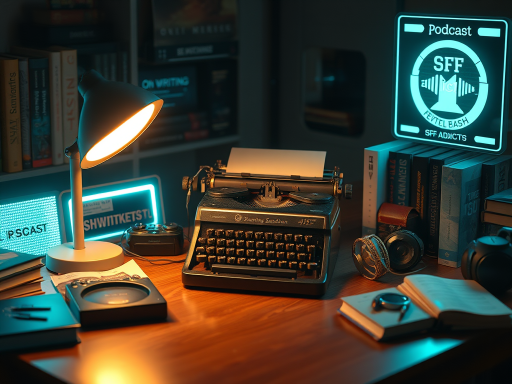Sci-fi and fantasy writing podcasts and advice worth checking out
I’ve recently come across a couple of writing podcasts that are worth checking out for any aspiring sci-fi or fantasy authors.
The first is On Writing With Brandon Sanderson. Sanderson is a bestselling epic fantasy author with a number of major series under his belt, not the least of which was completing Robert Jordan’s Wheel of Time series after Jordan died. Sanderson was a major long time anchor on one of my favorite podcasts, Writing Excuses. And while I still listen to that podcast, it hasn’t been the same since he left.
On Writing is mostly recordings of lectures Sanderson is giving to a class, although there are some web exclusives mixed in. It’s a chance to get insights on the approach used by one of the most successful fantasy authors out there. Sanderson also posts video versions on his Youtube channel, if that’s more your preferred mode.
The other podcast is SFF Addicts, a podcast that includes interviews of sci-fi and fantasy authors, as well as conference panels, all discussing writing techniques like plotting, character development, and worldbuilding. I discovered this one when John Scalzi posted a link to his interview on it. But they also talk to people like Adrian Tchaikovsky, Daniel Abraham and Ty Franck (of James S. A. Corey fame), Richard K. Morgan, and many others.
One thing I like about this podcast is it isn’t just focused on traditional publishing. There’s a lot of discussion with indie / self published authors, including on the business of what needs to be done to make it work.
I’m still working my way through the archives on this one. I won’t say all the episodes are winners. And a warning for anyone sensitive; there’s a fair amount of swearing in the discussions. But on balance it seems like an amazing resource.
I’m always on the lookout for additional advice in this space, but philosopher Eric Schwitzgebel recently did a post that contained advice I needed to hear. Schwitzgebel is a successful sci-fi short story writer, having his stories published in Clarkesworld and other major magazines. His advice is aimed at his fellow academics. But it seems relevant for any aspiring fiction writer.
The part that is really giving me something to think about is on cherishing and protecting the joy of writing. Schwitzgebel advises against being too instrumentalist, too business-like in our approach. He notes that taking joy in it means we’re more willing to work on writing we might have to eventually discard, helps in developing our own unique voice, and helps with the fact that most of us, even if successful, will never make a living at this, much less a fortune.
This advice reminds me of something Isaac Asimov wrote in his autobiography.
The question is: How does one become a really prolific writer?
It is a matter to which I have given much thought and it seems to me that the very first requirement is that a person have a passion for the process of writing. I don’t mean that he must enjoy imagining he is writing a book or enjoy dreaming up plots. I don’t mean that he must enjoy holding a finished book in his hands and waving it triumphantly at people. I mean he must have a passion for what goes on between the thinking of a book and its completion.
He must love the actual operation of writing, the scratching of a pen across a blank piece of paper, the pounding of typewriter keys, the watching of words appear on the word-processor screen. It doesn’t matter what technique is used as long as he loves the process.
Asimov, Isaac. I, Asimov: A Memoir (p. 201). Random House Publishing Group. Kindle Edition.
Asimov goes on to note that you don’t have to enjoy the act of writing to be a writer, or even a great one. But it sure helps with productivity. (It’s worth noting that Asimov probably took this to an unhealthy extreme, seldom leaving his apartment or doing exercise, which may have contributed to his health problems later in life. So we shouldn’t despair if we don’t have his particular level of passion and productivity.)
My overall takeaway is I’ve probably been way too instrumentalist in my attitudes toward this in the last decade or so. I probably need to take Schwitzgebel’s advice and do some throwaway writing, or at least not be too concerned if what I produce ends up being thrown.
That’s what I’ve been coming across. Any writing resources you’ve seen recently worth sharing? Or other sources of tips and inspiration?



